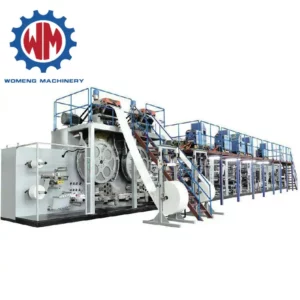Diaper machines contribute to public health initiatives and disease prevention efforts in several ways:
- Improved Hygiene: Diaper machines enable the mass production of disposable diapers, which help maintain better hygiene standards, particularly for infants and individuals with incontinence issues. Access to clean and absorbent diapers reduces the risk of skin irritation, infections, and other hygiene-related health problems.
- Infection Control: By providing a convenient and hygienic way to manage urinary and fecal waste, diapers help prevent the spread of infectious diseases, especially in healthcare settings such as hospitals and nursing homes. Proper diaper usage and disposal reduce the risk of contamination and cross-infection among patients and caregivers.
- Reduced Odor and Contamination: Diaper machines produce diapers with advanced absorbent materials and odor-control features, minimizing unpleasant odors and reducing the spread of airborne pathogens associated with fecal and urinary waste. This contributes to a cleaner and healthier environment, particularly in crowded or enclosed spaces.
- Promotion of Safe Disposal Practices: Diaper machines encourage the use of disposable diapers, which are often designed for convenient and hygienic disposal. Proper disposal of used diapers helps prevent environmental contamination and reduces the risk of waterborne diseases by minimizing the release of pathogens into water sources.
- Enhanced Comfort and Dignity: Access to clean and comfortable diapers improves the quality of life for individuals who require them, including infants, elderly adults, and individuals with disabilities or medical conditions. Diapers help maintain dignity and independence by allowing individuals to manage their personal hygiene needs effectively.
- Prevention of Diaper Rash and Skin Irritation: Modern diaper machines produce diapers with soft and breathable materials that help prevent diaper rash and skin irritation. By keeping the skin dry and reducing friction, diaper machine manufacturer these diapers minimize the risk of dermatological problems associated with prolonged exposure to moisture and irritants.
- Support for Maternal and Child Health: Diaper machines contribute to maternal and child health initiatives by ensuring access to essential hygiene products for infants and young children. Clean and dry diapers help prevent diaper-related health problems and support infant development by promoting comfort and mobility.
- Emergency Response and Disaster Relief: Diaper machines play a crucial role in emergency response and disaster relief efforts by providing essential hygiene supplies to affected populations, including families displaced by natural disasters or humanitarian crises. Access to diapers helps protect vulnerable individuals, particularly infants and young children, from health risks associated with unsanitary conditions.
Overall, diaper machines contribute to public health initiatives and disease prevention efforts by promoting hygiene, infection control, safe disposal practices, comfort, and dignity for individuals of all ages and abilities. By ensuring access to clean and absorbent diapers, these machines help protect against a range of health problems and support overall well-being in communities worldwide.
